The Most Powerful Gods in The World from Different Religions
Welcome to an extraordinary journey through the divine realm! In this captivating exploration, we delve into the extraordinary beings who have captivated countless civilizations with their awe-inspiring power and unfathomable might.
Brace yourselves as we unravel the enigmatic and majestic presence of the top 20 most powerful gods in the world. From ancient mythologies to modern belief systems, prepare to embark on a mythical quest that will leave you in absolute awe of these celestial beings and their undeniable influence over humanity.
Get ready to be enchanted, amazed, and spellbound as we unveil the divine hierarchy that has shaped cultures, civilizations, and the very fabric of our existence.
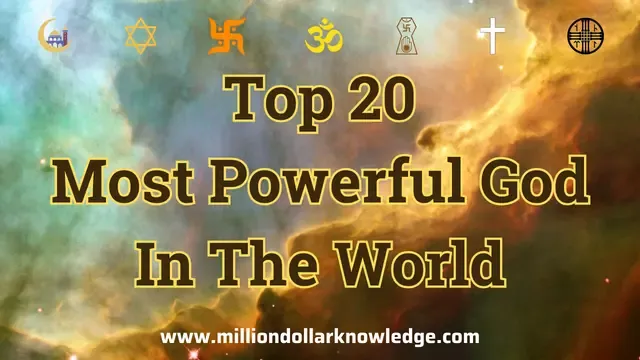 |
| Most powerful god in the world |
📖 Topic of Contents:
List of Most Powerful Gods in The World
In this compilation, we explore the top 20 most powerful gods from various mythologies and cultures, delving into their legends, characteristics, and the immense power they wielded over mortal and divine alike.
Lord Shiva
Lord Shiva, also known as Mahadeva (The Great God), is one of the most revered and worshipped deities in Hinduism. As per Hindu mythology, Lord Shiva is considered to be the supreme god who rules over the universe and maintains balance and harmony. As per the belief of Shaivism, Lord Shiva is the most powerful god in the world.
 |
| Lord Shiva |
Origin and Mythology:
According to Hindu scriptures, he is believed to be eternal and self-existent. In some legends, Lord Shiva is said to have been born from a cosmic pillar of light, known as the Lingam. This incident is known as the "Shiv Linga emerging from the pillar" or "Lingodbhava". Other legends mention that Lord Shiva was born from the union of Lord Brahma (the creator) and Lord Vishnu (the preserver) when they manifested as Ardhanarishvara (half male, half female) to defeat a powerful demon named Andhaka.
Domains of Power:
Lord Shiva is often depicted as the destroyer of evil forces, representing the process of transformation and regeneration. As the ruler of time and death, he is also known as Mahakala. Besides destruction, Lord Shiva is also considered to be the lord of meditation and spirituality, often depicted in deep meditation while seated on Mount Kailash. He is associated with Yoga and is believed to have imparted the knowledge of yoga and meditation to humanity.
Major Feats and Accomplishments:
Lord Shiva has accomplished many remarkable feats in Hindu mythology. The Puranas, a collection of ancient Hindu texts, narrate various stories showcasing his valor and benevolence. Some of the significant feats attributed to Lord Shiva include taming the mighty Ganga (the river goddess), consuming poison to save the universe during the churning of the ocean (Samudra Manthan), defeating various demons and asuras, and marrying the goddess Parvati.
Cultural Significance and Worship:
Lord Shiva is considered a symbol of purity, enlightenment, and liberation. Devotees believe that worshipping Lord Shiva brings blessings, protection, and spiritual growth. His divine attributes are celebrated through various festivals, such as Maha Shivaratri, which is dedicated to his worship. Many temples dedicated to Lord Shiva are spread across India, with some of the most famous ones being the Kashi Vishwanath Temple in Varanasi, the Somnath Temple in Gujarat, and the Amarnath Cave Temple in Jammu and Kashmir.
READ ALSO: Who is the father of lord shiva?
Lord Vishnu
Lord Vishnu holds a significant position in the Hindu pantheon, known as the preserver and protector of the universe. He is revered for maintaining order and balance in the cosmos. Vaishnav devotees are belive that Lord Vishnu is the supreme god and he is the most powerful god in the world.
 |
| Lord Vishnu |
Origin and mythology:
In Hindu mythology, Lord Vishnu is believed to have emerged from a primordial ocean called the "Ocean of Milk" during the creation of the universe. He is depicted as a blue-skinned deity with four arms, usually holding a conch shell, a discus, a mace, and a lotus flower. His mount is Garuda, a mythical half-human and half-eagle creature, symbolizing power and speed.
Domains of power:
It is believed that whenever the world is plagued by evil and chaos, Lord Vishnu incarnates on Earth in different forms, known as avatars, to restore righteousness and harmony. The ten most famous avatars of Lord Vishnu include Matsya, Kurma, Varaha, Narasimha, Vaman, ParasuRama, Rama, Krishna, and Buddha, Kalki (Upcoming future incarnation) each playing a significant role in specific eras of time to uphold dharma or righteousness.
Major feats and accomplishments:
Lord Vishnu's role in the epic Ramayana as Lord Rama is considered especially noteworthy. Lord Rama, the epitome of righteousness, embarks on a heroic journey to rescue his wife, Sita, from the demon king Ravana. Lord Vishnu's other avatar, Lord Krishna, is admired for his teachings in the Bhagavad Gita and his divine play, the Raas Leela, symbolizing the devotion between the divine and human souls.
Cultural significance and worship:
Devotees earnestly pray to him for protection, blessings, and guidance. Temples dedicated to Lord Vishnu, such as the Tirupati Balaji Temple in South India and the Jagannath Temple in Puri, Odisha, attract millions of pilgrims each year. The worship of Lord Vishnu is ingrained in various rituals and festivals such as Diwali, Vaikuntha Ekadashi, and Janmashtami, celebrating his avatars and veneration.
The worship of Lord Vishnu has also transcended geographical boundaries, with his devotion spreading to Southeast Asia, particularly in countries like Indonesia, Malaysia, and Thailand. The cultural significance of Lord Vishnu can be seen in various artistic representations, sculptures, and paintings around the world, portraying his divine presence and iconic depictions.
Lord Hanuman
Lord Hanuman, also known as Bajrangbali or Anjaneya, holds a significant place in Hindu mythology and is one of the most revered deities. Born in the kingdom of Kishkindha, Lord Hanuman is believed to be an incarnation of Lord Shiva. His origin can be traced back to the epic Ramayana, an ancient Indian scripture. I think we all must have heard about the power of Lord Hanuman, many of his devotees including me also believe that he is the most powerful God in the world.
 |
| Lord Hanuman |
Origin and mythology:
According to mythology, Lord Hanuman was born to Anjana and Kesari after they performed intense penance to seek a child. He was blessed by Lord Shiva and several other deities, bestowing him with incredible strength, knowledge, and wisdom. This mythical story adds to his divine heritage and unrivaled power.
Domains of power:
Lord Hanuman is known as the God of strength, devotion, bravery, and knowledge. His limitless strength is depicted through his ability to carry the entire mountain with herbs to save Lord Rama's brother, Laxmana. Hanuman is also revered as the ultimate symbol of devotion towards Lord Rama. His unwavering faith and loyalty earned him the title of "Bhakta Hanuman," the ideal example of a devotee.
Major feats and accomplishments:
Lord Hanuman actively participated in the battle between Lord Rama and the demon king Ravana in the epic battle of Ramayana. Hanuman played a pivotal role in the rescue of Lord Rama's wife, Sita, who was held captive by Ravana. He crossed the vast ocean to reach Lanka, carried the emblem of Lord Rama's ring to Sita to prove his identity, burned the city of Lanka with his burning tail, and single-handedly defeated numerous demons with his immense strength and agility.
Cultural significance and worship:
Lord Hanuman is considered a symbol of protection, courage, and strength. Devotees worship him to seek his blessings for physical and emotional strength, as well as overcoming obstacles. He is believed to ward off evil and bring prosperity into people's lives. Hanuman Jayanti, the birthday of Lord Hanuman, is widely celebrated with great fervor and devotion throughout India. Temples dedicated to Hanuman are found in various parts of the country, often witnessing a large number of pilgrims seeking solace and blessings.
In addition to religious ceremonies, various devotional practices honoring Lord Hanuman are prevalent. Recitation of the Hanuman Chalisa, a devotional hymn dedicated to him, is considered highly auspicious and is commonly practiced by believers. Many devotees also wear Hanuman lockets or carry their idol for protection and strength.
Lord Krishna
Lord Krishna is one of the most revered and adored deities in Hindu mythology. Believed to be the eighth incarnation of Lord Vishnu, Krishna's story can be traced back to ancient texts like the Mahabharata, Bhagavata Purana, and Srimad Bhagavad Gita. In his sermon, he told Arjuna that he is supreme, that he is the ultimate destination of all, and that every deity has originated from him. All these things represent Lord Krishna as the most powerful God in the world.
 |
| Lord Krishna |
Origin and mythology:
According to mythology, Krishna was born to Devaki and Vasudeva in Mathura, a city in northern India. His birth took place amidst difficult circumstances, as his maternal uncle, the evil King Kansa, sought to kill him as a prophecy had foretold his downfall at Krishna's hands. To protect the newborn, Krishna's father secretly carried him across the Yamuna River to Gokul, where he was raised by his foster parents, Yashoda and Nanda. Throughout his childhood, Krishna displayed remarkable divine qualities and performed miraculous acts, often using his enchanting flute to attract the hearts of people and steal their attention.
Domains of power:
Krishna's life is replete with captivating stories and extraordinary accomplishments. He was not only a deity but also a great warrior, diplomat, philosopher, and teacher. In the epic battle of Mahabharata, he acted as a charioteer for the warrior prince Arjuna and delivered the enlightening discourse of the Bhagavad Gita, imparting sublime wisdom and guidance to Arjuna about his duty, righteousness, and the eternal nature of the soul. The Bhagavad Gita has since become a sacred scriptural text, revered for its profound teachings on spirituality and moral values.
Major feats and accomplishments:
One of the most famous incidents from Krishna's life is the episode of Ras-Lila. In Vrindavan, Krishna playfully engaged in a dance with the Gopis (cowherd girls), symbolizing the divine love between God and his devotees. This leela (divine play) is considered a manifestation of Krishna's compassion and his invitation to all souls to connect with him through love and devotion.
Cultural significance and worship:
Krishna's enchanting persona, divine plays, and teachings continue to inspire millions worldwide. He represents divine love, playfulness, and cosmic consciousness. His teachings emphasize the importance of virtuous actions, selfless service, and devotion to God. Krishna is also associated with the concept of Bhakti (devotion) and is considered the embodiment of joy, laughter, and mirth.
Krishna is widely worshipped and celebrated in numerous festivals and religious ceremonies. Janmashtami, which marks Krishna's birth, is one of the most important Hindu festivals. Devotees fast, sing devotional songs, enact Krishna's childhood activities, and recreate his birthplace during the celebrations.
READ ALSO: 10 Clear signs that lord krishna is with you
Lord Kartikeya
Lord Kartikeya, also known by various names such as Skanda, Murugan, Subramanya, and Shanmukha, is a significant deity in Hindu mythology. He is considered to be the son of Lord Shiva and Goddess Parvati and holds a prominent place in the pantheon of Hindu gods. Some devotees of South India believe that Lord Murugan as the son of Lord Shiva is the most powerful god in the world.
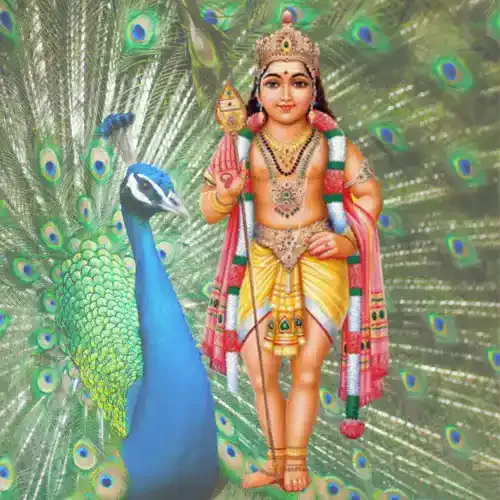 |
| Lord Kartikeya |
Origin and Mythology:
According to Hindu mythology, Lord Kartikeya was born to address the overpowering demon named Tarakasura, who was wreaking havoc on Earth. The story goes that after Lord Shiva had taken up an ascetic form, the Devas (Celestial gods) came to him seeking his help in defeating Tarakasura. However, due to his meditation, Shiva remained unaware of their pleas. To awaken him, the gods devised a plan to create a powerful being who could vanquish Tarakasura and restore peace.
Goddess Parvati conceived Lord Kartikeya without Lord Shiva's assistance, and he was nurtured by the six Krittikas, the celestial nymphs. After his birth, he emerged as a divine child with six faces representing wisdom, valor, generosity, beauty, fame, and spiritual knowledge. As Kartikeya grew up, he became the supreme commander of the celestial army and played a pivotal role in several battles against demons.
Domains of Power:
Lord Kartikeya is revered as the god of war, victory, courage, and intelligence. His presence is believed to bring protection, prosperity, and success. He is associated with knowledge, youth, and masculinity. Kartikeya is often depicted riding a peacock or a chariot pulled by peacocks, which symbolizes his grace, beauty, and unwavering focus.
Major Feats and Accomplishments:
Kartikeya's most notable feat is the defeat of the demon Tarakasura. He also played a significant role in the mythological war against demons known as the Tarakamaya war, leading the celestial forces to victory. Kartikeya's lance, known as Vel, which was gifted to him by Goddess Parvati, played a crucial role in vanquishing evil forces. Some myths also credit him with slaying other demons and protecting righteous beings.
Cultural Significance and Worship:
Lord Kartikeya is widely revered in various parts of India, particularly in South India, where he is considered the patron deity of the Tamil people. Tamil literature, particularly the epic poem "Kanda Puranam," is dedicated to him, describing his birth, valor, and divine exploits. Kartikeya is also revered in other parts of the world, such as Sri Lanka, Malaysia, and Singapore, where Hindu communities hold festivals and processions to honor him.
Devotees worship Lord Kartikeya seeking his blessings for success, victory, strength, and wisdom. His worship often involves the recitation of his sacred names, mantras, and hymns. The festival of Skanda Sashti, which falls on the sixth day after Diwali or during the Tamil month of Karthikai, is dedicated to celebrating Lord Kartikeya's triumph over evil forces.
Lord Ganesha
Lord Ganesha, also known as Ganapati or Vinayaka, holds a significant place in Hindu mythology and is revered as the remover of obstacles. Ganesha is one of the most widely worshipped deities in India and is a prominent figure in the religion. Indians are worship Lord Ganesha first because he is the remover of obstacles. According to the Puranas, he is the most powerful god in the world because of being born by Mother Parvati.
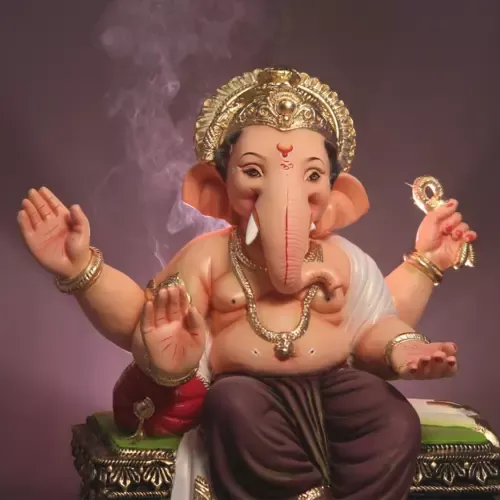 |
| Lord Ganesha |
Origin and mythology:
According to Hindu mythology, Ganesha is the son of Lord Shiva, the destroyer, and Goddess Parvati, the goddess of love and power. The story goes that once, while Parvati was bathing, she created Ganesha from the sandal paste on her body. She then breathed life into him and declared him as her son and the guardian of her abode.
However, when Lord Shiva returned from his wanderings and found Ganesha guarding the entrance, he was not aware of the boy's identity and attempted to enter, and a conflict arose. In a fit of rage, Shiva severed Ganesha's head. Upon seeing the grief-stricken Parvati, Lord Shiva promised to bring Ganesha back to life. He then commanded his followers to find the head of the first living being they saw to replace Ganesha's severed head. It turned out to be an elephant, thus giving Ganesha his elephant-headed form.
Domains of power:
Lord Ganesha is regarded as the lord of wisdom, intellect, and knowledge. He is known as the patron of arts and sciences, and he is often worshipped before any significant undertaking, seeking his blessings to overcome obstacles and ensure success. Additionally, Ganesha is considered the lord of new beginnings, and his presence is invoked during ceremonies or rituals.
Major feats and accomplishments:
Throughout mythology, Lord Ganesha has performed several major feats and accomplishments. One notable story revolves around the writing of the great Hindu epic, the Mahabharata. Sage Vyasa requested Ganesha to write the epic, which he agreed to, provided that Vyasa narrates the epic continuously without pausing. Vyasa, in turn, laid a condition that Ganesha should understand the meaning of each verse before writing it down. This epic task was accomplished due to Ganesha's extraordinary intelligence and wisdom.
Cultural significance and worship:
Lord Ganesha holds enormous significance and is worshipped with great devotion in various regions of India. He is celebrated in the annual festival of Ganesh Chaturthi, where devotees bring idols of Ganesha to their homes or public spaces for worship. During this festival, prayers, singing, and dancing take place in honor of Lord Ganesha. The festival climaxes with the immersion of the idols in water, symbolizing Ganesha's return to his celestial abode.
His worship and symbolism inspire people to overcome obstacles, seek knowledge, and embrace new beginnings. His teachings emphasize the importance of intelligence, wisdom, and perseverance. Devotees offer prayers, perform rituals, and chant mantras to seek Ganesha's blessings for a smooth and successful journey in life.
Swami Ayyappa (Manikanta)
Swami Ayyappa, also known as Lord Manikanta, is a revered deity in the Hindu pantheon. He holds a significant place in South Indian mythology and is worshipped predominantly in the states of Kerala, Telangana, Andhra Pradesh, Tamil Nadu, and Karnataka. Lord Ayyapa is worshiped with great reverence by the people of South India and considered to be the most powerful god in the world, as he originated from the main deities of Hinduism, Lord Shiva and Lord Vishnu (As a Mohini Avatar).
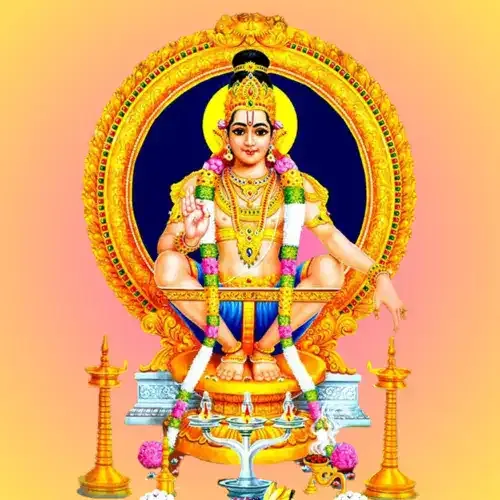 |
| Swami Ayyappa |
Origin and Mythology:
According to the legends, he is believed to be the son of Lord Shiva and the enchantress Mohini, who was an incarnation of Lord Vishnu. The story goes that to defeat the demon Mahishi, Lord Vishnu transformed into Mohini and attracted the attention of Shiva. Their union resulted in the birth of Ayyappa.
Domains of Power:
Swami Ayyappa is believed to embody courage, strength, and righteousness, making him a patron of warriors and protectors. Ayyappa is often depicted wielding a bow and arrow, a symbol of his mastery over weapons and his ability to confront evil forces. Additionally, he is associated with knowledge and wisdom, which makes him a revered deity for students and seekers of spiritual enlightenment.
Major Feats and Accomplishments:
One of the prominent feats associated with Swami Ayyappa is the defeat of the demoness Mahishi. She had obtained a boon that made her invincible against all male beings, except the son of Shiva and Vishnu. Ayyappa was able to vanquish Mahishi, thus restoring harmony and peace to the world. Another notable accomplishment attributed to him is the slaying of the demoness Mahishi's brother, Mahishasura.
Cultural Significance and Worship:
The worship of Swami Ayyappa has deep cultural significance, especially in the states of south India. Every year, millions of devotees embark on a pilgrimage known as the Sabarimala pilgrimage to seek the blessings of Ayyappa. It is believed that he meditated in the Sabarimala forest, and his temple there is one of the most revered pilgrimage sites in India.
The Sabarimala pilgrimage is known for its distinctive rituals and practices. Devotees, who are known as Ayyappans, observe strict fasting and celibacy for 41 days before the pilgrimage. They wear black attire and carry an offering known as Irumudi Kettu, which contains ghee, coconut, and other necessary items. The journey to Sabarimala is accompanied by traditional chants and prayers, creating a deeply spiritual atmosphere.
Swami Ayyappa's worshippers come from all walks of life and various religious backgrounds, as his following extends beyond the boundaries of Hinduism. His teachings emphasize devotion, self-discipline, and the pursuit of knowledge, making him an inspiration for seekers of all ages and backgrounds. His inclusive nature and universal appeal have contributed to the growth of his cult following in recent years.
READ ALSO: Vishnu Sahasranamam - 1000 names of Lord Vishnu
Vayudev or Pavandev
Vayudev, also known as Pavandev, is a prominent deity in Hindu mythology. As the god of the wind, he plays a vital role in the creation, preservation, and destruction of the world. Life is not possible without air and Vayudev is the god of wind, so in some eastern parts of India he is considered to be the most powerful god in the world.
 |
| Vayudev |
Origin and Mythology:
Vayudev is the son of Sage Kashyap, one of the Prajapatis or the creators of the universe, and Aditi, the mother of all gods. He is also considered as one of the eight Vasus, divine beings associated with various elements of nature. Vayudev's siblings include other deities like Indra (King of Devatas), Agni (the Fire God), and Surya (the Sun God).
According to Hindu mythology, Vayudev was born as a small baby who was quickly grown to adulthood by the gods due to a demon named Vritra who held the waters of the world captive. Fearing the loss of all life on earth, the gods implored Vayudev to help them defeat Vritra. With his immense power and swiftness, Vayudev blew a fierce wind, piercing through the demon's fortifications and allowing the rains to fall, ultimately vanquishing Vritra and saving the world.
Domains of Power:
Vayudev possesses the ability to control and manipulate air, wind, and storms. He can swiftly move across the world, encompassing both gentle breezes and destructive hurricanes within his realm. In Hindu mythology, the wind often represents life force, breath, and vitality, and Vayudev's domain also includes these concepts.
Major Feats and Accomplishments:
One of his notable accomplishments was his role in the churning of the cosmic ocean, known as the Samudra Manthan. During this event, the gods and demons churned the ocean to obtain the elixir of immortality. Vayudev played a pivotal part by using his powerful winds to help unravel various treasures and bestow them upon the gods.
Cultural Significance and Worship:
Vayudev is often revered as the life-giving force and is considered one of the most important deities among the elements of nature. His presence is vital for the balance and sustenance of the world. He is closely associated with the monsoon season, as his winds bring rain and fertility to the land, ensuring bountiful harvests.
Worship of Vayudev is common in regions where the monsoon season is crucial for agriculture, such as India and Nepal. Devotees offer prayers and perform rituals to appease Vayudev, seeking his blessings for favorable weather conditions and abundant rainfall. Many people also invoke his name to gain knowledge, wisdom, and spiritual growth. Vayudev is often depicted riding on a deer or an antelope, symbolizing his swift movements and connection to the wilderness.
READ ALSO: Mysterious birth of Sudarshan Chakra
Maa Durga
Maa Durga holds a significant place in Hindu mythology and is widely worshipped in various parts of the Indian subcontinent. She is considered the supreme female deity, representing the divine feminine power or Shakti. Durga symbolizes strength, courage, and protection against evil forces. Maa Durga is the embodiment of Shakti, the demon whom no one could kill was killed by Maa Durga, that's why devotees consider her to be the most powerful goddess in the world.
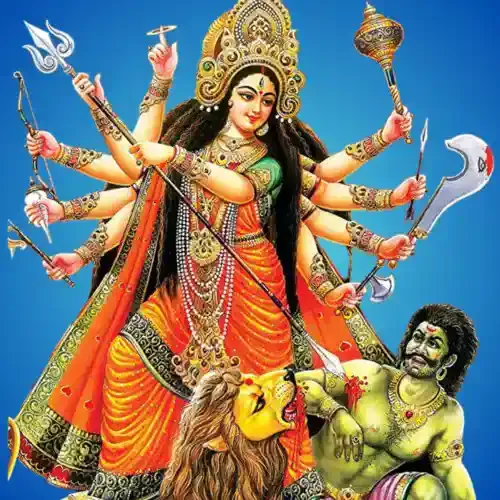 |
| Maa Durga |
Origin and Mythology:
According to Hindu mythology, Maa Durga was created by the combined powers of several gods, including Brahma, Vishnu, Shiva, and others, to defeat the demon Mahishasura. Mahishasura had unleashed chaos and terror on both heaven and earth, and the gods were unable to defeat him individually. Thus, they created Devi Durga, who possessed divine weapons and immense strength, to vanquish the demon.
Domains of Power:
Maa Durga is believed to possess multiple domains of power, representing different aspects of life and nature. She is revered as the goddess of power (Shakti) and can be seen as the embodiment of different goddesses. For instance, as Parvati, she symbolizes love and marital bliss, while as Kali, she represents destruction and time. Moreover, she is associated with wisdom, fertility, protection, and courage.
Major Feats and Accomplishments:
Goddess Durga's most famous act is the defeat of the demon Mahishasura, hence earning her the name "Mahishasuramardini". In this epic battle, she fought for nine consecutive nights and finally slayed Mahishasura on the tenth day, which is celebrated as Vijayadashami or Dussehra. Durga's ultimate victory embodies the triumph of good over evil.
Cultural Significance and Worship:
The worship of Maa Durga holds immense cultural significance in Hinduism. Navaratri or Durga Puja, a nine-night festival celebrated across India, is dedicated to her. This festival not only commemorates the goddess's victory over Mahishasura but also celebrates the eternal power of the divine female energy.
During Navaratri, elaborately decorated idols of Goddess Durga are worshipped, and various traditional rituals and cultural performances take place. Devotees offer prayers, light lamps, sing devotional songs, and perform elaborate dances, known as Garba and Dandiya, in her honor.
Maa Durga's worship represents the belief in feminine strength, courage, and righteousness. She is seen as the embodiment of a fierce motherly figure who protects her devotees from evil influences and grants them strength and prosperity. Many people consider her as the divine force that can eliminate their troubles and bring a positive transformation in their lives.
Maa Kali
Maa Kali is a revered Hindu deity who holds a prominent place in Indian mythology and religious practices. She is often depicted as a fierce and fearsome goddess, representing destruction, transformation, and liberation. No one could stop Maa Kali except Lord Shiva, that's why devotees of Mata Kali consider her as the most powerful goddess in the world.
 |
| Maa Kali |
Origin and mythology:
The origin of Maa Kali can be traced back to ancient Hindu scriptures, particularly the Devi Mahatmya (also known as the Durga Saptashati or Chandi Patha). According to the mythology, the goddess Kali emerged from the brow of the goddess Durga during her battle against the demon Raktabija. Raktabija could multiply from every drop of his blood that touched the ground, making him invincible. To defeat him, Maa Kali drank his blood before it touched the ground, annihilating the demon's army and ultimately leading to his defeat. Thus, Maa Kali is considered the embodiment of the power to annihilate and destroy evil forces.
Domains of power:
Maa Kali's ferocious appearance is depicted with her jet-black skin, wild hair, and necklace made of severed heads. She is also shown wearing a skirt made of human arms and holding weapons like the trident and the sword. This portrayal signifies her strength, courage, and warlike nature. She is believed to be the supreme power of time, being beyond it yet controlling it. Kali is associated with the element of fire and is considered as a symbol of primal energy.
Major feats and accomplishments:
In addition to her defeat of the demon Raktabija, she is also believed to have defeated various other demons and evil forces threatening the world. She possesses the ability to destroy and transform negativity into positivity, allowing individuals to experience liberation from their suffering and limitations. Maa Kali is often worshiped as the ultimate protector against evil forces, and devotees seek her blessings to overcome obstacles and attain spiritual enlightenment.
Cultural significance and worship:
Maa Kali is particularly worshiped in Bengal, India, where the festival of Kali Puja is celebrated with great pomp and grandeur. During this festival, devotees engage in elaborate rituals, offer prayers, and perform sacrifices to honor and seek the blessings of Maa Kali. It is believed that worshiping her bestows courage, protection, and the power to overcome any difficulties in life. Additionally, Maa Kali is also revered by various other sects and spiritual practitioners who realize the transformative power she represents.
Tengri
Tengri is a prominent deity in the ancient Turkic and Mongolic mythologies. The name Tengri itself translates to "Heaven" in the Turkic languages. Tengri is often depicted as an omnipotent and benevolent sky deity, symbolizing the ultimate source of power and spirituality. The inhabitants of Mongolia, where King Genghis Khan conquered almost the entire world, consider Tengri to be the most powerful god in the world.
 |
| Tengri |
Origin and mythology:
It is believed that at the beginning of the universe, there was only an endless expanse of water. Above this vast sea, there was a heaven and below it, an underworld. Tengri emerged from the celestial realm and created the world by lifting up the heavens to separate it from the waters below. The Earth was formed within this space with Tengri as its supreme ruler.
Domains of power:
Tengri is associated with various domains of power, including the sky, weather, fate, creation, and life. As the sky deity, Tengri controls celestial phenomena such as thunder, lightning, rain, and storms. He is believed to be the one who creates rainbows in the sky and sends wind to move clouds. Tengri's control over the weather makes him a crucial figure for nomadic civilizations, as they heavily rely on favorable climates for their survival and livelihood.
Major feats and accomplishments:
According to the myth, Tengri molded humans out of clay and breathed life into them, thus becoming their ultimate guardian and protector. It is believed that Tengri allotted each individual destiny, and it is this destiny that determines the course of their lives. Tengri is seen as the ultimate judge and arbiter of human actions, overseeing justice and guiding individuals toward righteousness.
Cultural significance and worship:
The worship of Tengri played a central role in their spiritual and religious practices. Nomadic tribes would often offer prayers and sacrifices to Tengri, seeking his blessings for good weather, successful hunts, and protection from harm. The belief in Tengri fostered a strong sense of unity and communal identity among these tribes, as they saw themselves as followers of Tengri.
Over time, Tengri became incorporated into other religious systems in Central Asia, such as Tengrism and Turkic shamanism. Today, Tengri's influence can still be seen in the cultural and religious practices of Turkic and Mongolic communities. Many festivals and traditional ceremonies still pay tribute to Tengri, symbolizing the continuity of this ancient belief system.
READ ALSO: Trishul - The most powerful weapon in hindu mythology
Allah
Allah is the supreme and singular deity in Islam. Originating from the Arabian Peninsula in the early 7th century, Islam is the world's second-largest religion, with over 1.8 billion followers. Islam is the second most widely spread religion in the world, its followers believe in Allah as their God and consider him to be the most powerful god in the world.
 |
| Allah |
Origin and mythology:
Allah's origin can be traced back to ancient Arabia. Before the advent of Islam, the Arabian Peninsula was home to numerous polytheistic belief systems, with a variety of gods and goddesses worshipped by different tribes. However, as Islam emerged in the 7th century CE, it gradually unified the Arabian tribes under monotheism, proclaiming Allah as the sole and supreme deity.
Muslims believe that Allah had no origin or birth, and existed eternally. Allah is viewed as beyond human comprehension and is considered to be transcendent, omnipotent, and omniscient. Notably, Allah is seen as the same god worshipped by Jews and Christians, making Islam an Abrahamic religion.
Domains of power:
Muslims believe that Allah is the creator of the universe, including everything within it. He controls all aspects of life, such as time, fate, and natural phenomena. He is also believed to possess absolute knowledge and govern all moral and ethical boundaries.
Major feats and accomplishments:
The most notable of these is the revelation of the Quran, which is considered the literal word of God as communicated to the Prophet Muhammad. It is believed to be the final and most comprehensive divine message to humanity.
Another significant accomplishment of Allah is the creation of Adam, the first human being. Muslims believe that Allah shaped Adam from clay and breathed life into him, making humans his greatest creation. Additionally, Muslims believe that Allah sent numerous prophets throughout history to guide and instruct humanity, including prominent figures such as Noah, Abraham, Moses, and Jesus.
Cultural significance and worship:
Muslims believe in strict monotheism, emphasizing the concept of Tawhid, which states that there is only one God – Allah. This belief is central to Islamic teachings and forms the foundation of Muslim worship.
Muslims worship Allah through various forms of devotion, such as prayer, fasting, alms-giving, and pilgrimage. The five pillars of Islam outline essential acts of worship that every muslim is obligated to observe. Additionally, Allah's name is invoked by Muslims in daily life, during supplications, and before undertaking any significant endeavor.
Allah's teachings guide all aspects of life for Muslims, including personal morality, family values, societal codes, and legal systems. Islamic art, poetry, and literature often reflect devotion to Allah, visually and spiritually expressing the beauty and majesty associated with the concept of God.
READ ALSO: Ibnul Arabi Thoughts about Allah
Jesus Christ
Jesus Christ is a central figure in Christianity, believed by millions of followers to be the Son of God and the savior of humanity. The origin and mythology surrounding Jesus are grounded in the New Testament of the Bible, specifically the four Gospels: Matthew, Mark, Luke, and John. Christianity is the most widely spread religion in the world, its followers consider Jesus Christ as their God and consider him as the most powerful God in the world.
 |
| Jesus Christ |
Origin and mythology:
According to Christian tradition, Jesus Christ was born in Bethlehem around 4 to 6 BCE, although the exact date remains a subject of debate. He was raised in Nazareth and began his public ministry around the age of 30. Jesus preached about God's kingdom, performed miracles, and taught his followers about love, forgiveness, and salvation. His teachings often challenged the religious and political authorities of his time, which eventually led to his arrest, trial, crucifixion, and resurrection.
Domains of power:
Jesus is believed to possess divine attributes such as omniscience, omnipotence, and omnibenevolence. Christians consider Jesus to be the bridge between God and humanity, who sacrificed himself to atone for the sins of all people. His role as the divine mediator and redeemer is seen as foundational to the Christian faith.
Major feats and accomplishments:
One of Jesus Christ's major feats and accomplishments, as depicted in Christian belief, is his resurrection from death. According to the Gospels, Jesus was crucified and buried, but on the third day, he rose from the dead, demonstrating his power over death and offering hope for eternal life to those who follow him. This event is commemorated annually by Christians during the celebration of Easter, which marks the resurrection of Jesus.
Cultural significance and worship:
Christianity, as established in the wake of Jesus's life, teachings, and resurrection, became one of the world's major religions. It has influenced art, literature, music, ethics, philosophy, and political structures, serving as a foundation for Western civilization. The teachings of Jesus, such as the Golden Rule and the commandment to love one's neighbor, have had a lasting impact on moral principles across various cultures.
Worship of Jesus Christ takes various forms within Christianity. The most common form is through participation in Christian communities, churches, and religious ceremonies. Christians believe that through faith in Jesus, their sins are forgiven, and they receive salvation and eternal life. In addition to communal worship, many Christians engage in personal prayers, meditation, and the reading of the Bible to deepen their relationship with Jesus.
READ ALSO: What is Easter and why it is celebrated?
Zeus
Zeus, also known as Jupiter in Roman mythology, is one of the most powerful and prominent deities in ancient Greek mythology. He is the supreme god and ruler of the heavens, possessing immense power and authority over the natural world and mortals. Zeus is often depicted as a bearded and majestic figure, wielding a thunderbolt as his main attribute. Since ancient times, the Greeks considered Zeus to be the most powerful god in the world.
 |
| Zeus |
Origin and mythology:
Zeus was born to Cronus and Rhea, who were both Titans. Cronus, fearful of a prophecy that one of his children would overthrow him just as he did to his father Uranus, devoured his offspring, including Zeus. However, Rhea managed to save Zeus by hiding him on the island of Crete and tricking Cronus into swallowing a stone wrapped in swaddling clothes instead. Eventually, Zeus grew strong and returned to overthrow Cronus, liberating his siblings, and the other Olympian gods.
Domains of power:
As the king of the gods, Zeus influences various domains. He is primarily associated with the sky, thunder, lightning, and storm. Zeus controls the weather and is responsible for the thunderbolts that are often wielded to bring divine justice or punish those who cross him. He is also seen as the guardian of oaths and hospitality, ensuring loyalty among mortals and gods. Zeus's power extends over the entire Olympian pantheon, as he presides over their council and has the final say in matters.
Major feats and accomplishments:
One of his most notable accomplishments was defeating the Titans in a great battle known as the Titanomachy, establishing the reign of the Olympian gods. He then went on to overthrow his father, Cronus, fulfilling the prophecy and becoming the supreme ruler. Zeus is known for his numerous love affairs and fathered many famous demigods, including Heracles (Hercules).
Cultural significance and worship:
Zeus is viewed as a protector and father figure, offering guidance and decreeing justice. His role as the king of the gods and his association with storms and lightning demonstrate his power and authority. Zeus was widely worshipped and had numerous temples dedicated to him throughout the Greek world, such as the famous Temple of Zeus in Olympia, which housed one of the Seven Wonders of the Ancient World. Festivals, such as the Olympic Games, were held in his honor. Additionally, Zeus played a central role in many myths and legends, serving as a source of inspiration, wisdom, and awe for the ancient Greeks.
Apollo
Apollo, originating from ancient Greek mythology, was one of the most important and widely worshipped gods of the time. He was revered as the god of various domains, such as music, art, poetry, healing, archery, and the sun. Apollo's multi-faceted nature and significant achievements have made him an essential figure in Greek and Roman culture.
 |
| Apollo |
Origin and mythology:
According to the mythological stories, Apollo was the son of Zeus, king of the gods, and Leto, a Titaness. He was born on the Greek island of Delos and his birth is often associated with light and purity. In Greek mythology, Apollo was known for his charm, beauty, and incredible talent. He was often depicted as a young man with a lyre, which he skillfully played.
Domains of power:
Apollo's domains of power covered a wide range of aspects, making him a god of many things. His role as the god of music and poetry made him the leader of the Muses, the goddesses who inspired artists and musicians. As the god of healing, Apollo was believed to have the ability to cure diseases and bless individuals with good health. His association with the sun emphasized him as a powerful solar deity who controlled the movement of the sun and brought light and warmth to the world. Additionally, Apollo's expertise in archery and prophecy added to his divine abilities.
Major feats and accomplishments:
One of Apollo's major feats was the slaying of the Python, a monstrous serpent that guarded the oracle of Delphi. The Python, sent by the jealous Hera to harm Leto, was eventually defeated by Apollo's arrows. As a result, the Oracle of Delphi became Apollo's sanctuary, and he was known as the god of prophecy, providing guidance and predictions to mortals through the oracle.
Another significant accomplishment was Apollo's role in the Trojan War, a legendary conflict between the Greeks and Trojans. Apollo fought alongside the Trojans, defending the city of Troy and aiding its warriors. He famously guided Paris, the Trojan prince, to shoot an arrow that struck Achilles, a Greek hero, leading to his demise.
Cultural significance and worship:
Several important Greek cities, such as Athens and Delphi, dedicated temples and festivals to Apollo. His association with music and arts made him a patron god for creative endeavors, inspiring countless artists and musicians throughout history. The Pythian Games, held every four years in Delphi, included musical and athletic competitions dedicated to Apollo.
The worship of Apollo extended into Roman culture, where he was known as Apollo or Apollo Helios. The Romans embraced his attributes and incorporated him into their pantheon of gods. The Roman Empire even built a grand temple to Apollo in Rome, emphasizing his immense importance.
READ ALSO: Why hanuman chalisa is so powerful?
Odin
Odin, also known as Woden or Wotan, is a prominent figure in Norse mythology and the king of the Aesir gods in the Norse pantheon. As the Allfather, he presides over wisdom, war, death, poetry, and runes.
 |
| Odin |
Origin and mythology:
According to Norse mythology, Odin is the son of Bor and Bestla and the brother of Vili and Ve. Together, they fought against the primordial giant Ymir and created the world from his body. Odin, along with his brothers, is responsible for shaping and governing the cosmos. In some myths, Odin is also depicted as a shamanistic figure who sacrificed his eye to gain infinite wisdom and insight for the betterment of the gods and humankind.
Domains of power:
As the god of war, he inspires bravery in battle and is often depicted wielding the spear Gungnir. He is also known as the god of death, ruling over Valhalla, a warrior's afterlife where fallen heroes are invited to feast and prepare for the final battle of Ragnarok. Additionally, Odin is the god of poetry, often represented as a patron of skalds (Norse poets) and musicians. In this role, he is associated with the magical art of seidr, a form of divination performed by shamans.
Major feats and accomplishments:
Odin traveled far and wide to attain wisdom, seeking knowledge from giants, dwarves, and other mythical beings. One of his most significant achievements was discovering the runes, a system of writing and divination used by the Norse people. Odin also retrieved the mead of poetry, a magical potion made from the blood of Kvasir, which grants the power of poetic inspiration. He achieved this by undertaking a perilous quest, tricking the giant Suttungr, and winning the heart of Gunnlod, Suttungr's daughter.
Cultural significance and worship:
Odin held immense significance among the Norse and Germanic peoples. As the father of the gods, he was revered as a wise and powerful deity. The concept of kingship in Norse society was closely associated with Odin's rule, and many rulers claimed their lineage traced back to him. The Valknut, a symbol consisting of three interlocking triangles, is often associated with Odin and can be found carved on ancient runestones and artifacts. The Norse people would worship Odin in elaborate ceremonies and rituals, often making offerings and sacrifices to seek his favor.
Ahura Mazda
Ahura Mazda, also known as Ohrmazd, is the supreme deity in Zoroastrianism, one of the world's oldest religions. Originating in ancient Persia (modern-day Iran), Ahura Mazda has been revered as the creator and source of all goodness and light. His name translates to "Wise Lord" or "Lord of Wisdom."
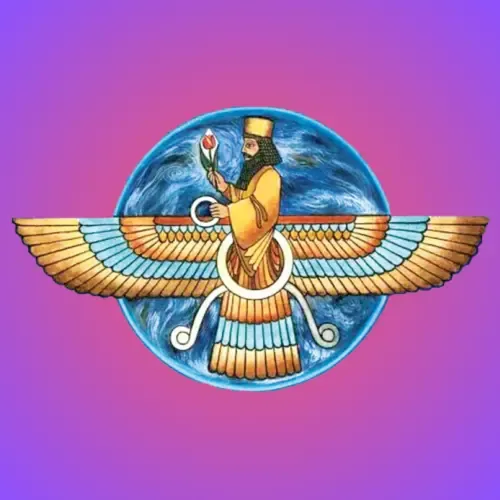 |
| Ahura Mazda |
Origin and mythology:
According to Zoroastrian mythology, Ahura Mazda exists as the embodiment of righteousness, wisdom, and truth. He is believed to have created the universe and all things good within it. Ahura Mazda is depicted as a benevolent and just deity, embodying moral and ethical perfection. In contrast, his rival, Angra Mainyu (or Ahriman), personifies darkness, chaos, and evil, perpetually battling Ahura Mazda in an eternal cosmic struggle.
Domains of power:
Ahura Mazda represents different aspects of creation and existence. These domains include wisdom, justice, truth, order, and cosmic harmony. He is also associated with light, fire, and the sun, symbolizing enlightenment, purity, and warmth. Fire temples, where Zoroastrians worship, contain an eternal fire representing the presence of Ahura Mazda.
Major feats and accomplishments:
One notable instance is defeating Angra Mainyu in battles, emblematic of good triumphing over evil. Ahura Mazda is credited with creating various beneficial elements, such as the wind, water, plants, and animals, which sustain life on Earth. He is also believed to have sent prophets, such as Zoroaster, to guide humanity toward righteousness and salvation.
Cultural significance and worship:
Religion emerged as a major spiritual force in ancient Persia and significantly influenced subsequent belief systems, including Judaism, Christianity, and Islam. Zoroastrians consider Ahura Mazda the ultimate source of moral guidance and seek to align their lives with his teachings. Worship revolves around prayer, rituals, and veneration offered to Ahura Mazda and his divine attributes.
Today, Zoroastrianism is practiced by a relatively small community, primarily in Iran and India. As one of the oldest monotheistic religions, it continues to inspire admiration and respect for its philosophy of good thoughts, good words, and good deeds. Ahura Mazda remains a central figure in this faith, embodying the ideals of wisdom, justice, and benevolence.
READ ALSO: History of Thanksgiving in USA
Goddess Athena
Goddess Athena, also known as Pallas Athena, is a prominent figure in Greek mythology. She is often depicted as the goddess of wisdom, courage, strategic warfare, and domestic crafts.
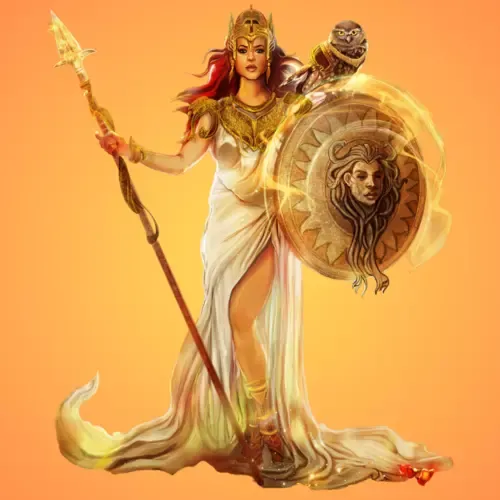 |
| Goddess Athena |
Origin and mythology:
According to ancient Greek mythology, Athena was born fully grown and fully armored from the head of her father, Zeus. This unique birth represents her wisdom and strategic mind, as she is born as an adult. Legend has it that Zeus had swallowed Athena's mother, Metis, fearing that she would bear a child more powerful than him. However, the goddess remained alive within Zeus until Athena's birth.
Domains of power:
Athena stands out among the gods and goddesses not only for her military prowess but also for her wisdom and intellectual nature. She is often associated with tactics, strategic warfare, and promoting peace. Athena is renowned for her contribution to the development of various crafts, including weaving, pottery, and metallurgy. This association with domestic crafts, along with her intelligence and wisdom, makes her an emblem of balanced, multifaceted power.
Major feats and accomplishments:
One of Athena's major feats and accomplishments is her role in the Trojan War. She supported the Greeks, and her strategic counsel proved vital to their eventual victory against the Trojans. Athena's involvement in the Trojan War showcased her military acumen and courage. It is said that she was particularly devoted to the hero, Odysseus, and provided him with assistance and guidance on his long journey back home, as depicted in Homer's epic poem, The Odyssey.
Cultural significance and worship:
Athena is considered to be one of the twelve Olympian gods, who resided on Mount Olympus and held significant influence over mortal affairs. Athena is widely celebrated for her wisdom, intelligence, and fairness. The Parthenon, a magnificent temple built atop the Acropolis in Athens, was dedicated to Athena and served as a symbol of the city's veneration towards the goddess. Athens, the capital of Greece, takes its name from Athena, further demonstrating her cultural importance.
Worship of Athena was widespread in ancient Greece, particularly in Athens, where her cult was particularly prominent. Festivals like Panathenaia were held annually in her honor, featuring grand processions, athletic contests, and religious ceremonies. Temples and statues were built in her image, and sacrifices and prayers were offered to seek her blessings. It was believed that Athena's favor could bring wisdom, victory in battle, and prosperity to her worshippers.
Hades
Hades, the ancient Greek god of the Underworld, has a rich mythology and holds significant importance in Greek culture. Often portrayed as a stern and somber deity, Hades ruled over the realm of the dead and was primarily responsible for the souls of mortals who had passed away.
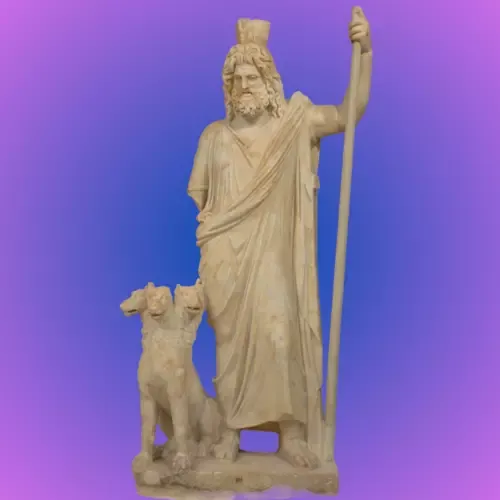 |
| Hades |
Origin and mythology:
According to Greek mythology, Hades was one of the three sons of Cronus and Rhea, brother to Zeus and Poseidon. After the downfall of their powerful father, Zeus gained control of the skies, Poseidon became the god of the sea, and Hades was designated as the ruler of the Underworld. It is believed that Zeus assigned Hades this realm due to his eldest brother's infamy for being just and fair.
Domains of power:
As the god of the Underworld, Hades presided over various domains of power, the most prominent being the supervision of the dead. Upon a mortal's demise, their soul would travel to the Underworld where it faced a judgment by Hades. If the soul was deemed worthy, it would proceed to the Elysian Fields, a paradise-like realm reserved for the virtuous and heroic. However, if judged unfavorably, the soul would be condemned to suffer in Tartarus, a realm reserved for wickedness and eternal torment. Hades held absolute power over the fate of every soul that entered his realm.
Major feats and accomplishments:
One of his major feats was abducting Persephone, the daughter of Demeter, the goddess of agriculture and fertility. This incident occurred upon Zeus's instructions, and Persephone became Hades' wife and queen of the Underworld. This event not only highlighted his authority over the realm but also linked him closely to the cycle of life and death.
Hades also played a crucial role in several myths and legends. For instance, he was pivotal in the tale of Orpheus and Eurydice, in which the musician Orpheus descended into the Underworld to attempt to rescue his deceased wife. Hades was moved by Orpheus' musical talents and agreed to allow Eurydice to return to the world of the living on the condition that Orpheus did not look back at her until they reached the surface. Unfortunately, Orpheus couldn't resist, and Eurydice was lost forever.
Cultural significance and worship:
In Greek culture, Hades symbolized both the inevitability and fear of death, as well as the judgment and consequences humans faced after their passing. Worship of Hades was an integral part of ancient Greek religious practices, and rituals were often held to honor and appease him. Temples and shrines were dedicated to him throughout Greece, with offerings and sacrifices made to secure his favor and protection.
READ ALSO: Complete History of Pallava Dynasty
Goddess Hera
Goddess Hera, the Queen of the gods in Greek mythology, has a rich and complex origin and mythology. She is the daughter of the Titans Cronus and Rhea and is the sister and wife of Zeus, the king of the gods. Being the wife of the king of the Greek gods, the Greeks considered the Goddess Hera to be the most powerful goddess in the world.
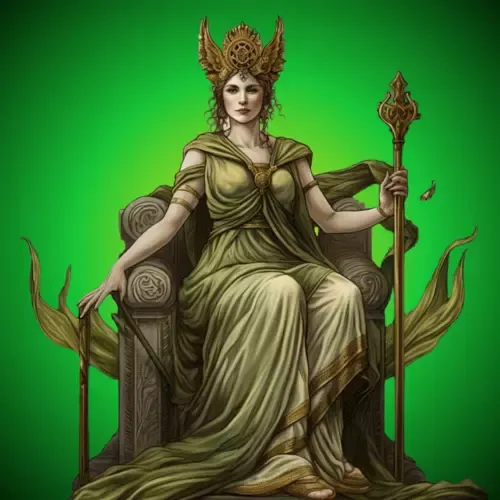 |
| Goddess Hera |
Origin and mythology:
In Greek mythology, Hera is believed to have been born on the island of Samos, where she was raised by Oceanus and Tethys before marrying Zeus. Her marriage to Zeus is a central aspect of her mythology, although it was tumultuous due to Zeus' many infidelities. As a result, Hera is often depicted as a jealous and vengeful deity, fiercely protecting her union and punishing the lovers of Zeus and their offspring.
Domains of power:
Hera is the goddess of marriage and childbirth, symbolizing the sacred bond between spouses and overseeing the protection of families. In this role, she is often portrayed as a nurturing and protective figure, particularly to mothers and children. Additionally, Hera is the goddess of women, fertility, and the home, representing the importance of female power and the stability of the household.
Hera is also associated with the heavens and the natural elements. She is sometimes considered the goddess of the sky and stars, personifying the majestic and ethereal aspects of the cosmos. Furthermore, she possesses control over the environment, exhibiting influence over weather phenomena such as rain and storms. This portrayal highlights her connection with nature and her ability to unleash her wrath through the elements.
Major feats and accomplishments:
One of her most notable achievements is her participation in the Gigantomachy, the battle between the gods and the Giants. Hera played an integral role in securing the Olympian victory, using her cunning and power to trick the Giants and render them vulnerable to defeat. Additionally, she also played a fundamental part in the Trojan War, supporting the Greek army against the Trojans due to a grudge against Paris, who had chosen Aphrodite as the most beautiful goddess over her.
Cultural significance and worship:
Hera symbolized the ideal wife, embodying virtues such as loyalty, fidelity, and commitment. Her worship was prevalent throughout Greece, particularly in Argos and Olympia, where her temples stood as grand structures dedicated to her divinity. Festivals, such as the Heraia, were held annually to honor her, and games were organized in her name to celebrate her enduring influence and power.
Conclusion
The existence of powerful gods has been ingrained in human culture and mythology across the world. Although the list of these top 20 most powerful gods may vary depending on different viewpoints and belief systems, it is clear that these gods have held immense importance and influence in shaping religious beliefs and practices throughout history.
Their stories, powers, and symbolism continue to fascinate and inspire individuals, providing a deep understanding of the diverse spiritual traditions that have shaped our world.
Whether worshipped as guardians, creators, or rulers, these gods represent the enduring human quest to comprehend and connect with forces greater than ourselves.
DISCLAIMER: The list of the "Top 20 Most Powerful Gods in the World" is based on various mythologies and beliefs from different cultures throughout history. It is important to note that the inclusion of any deity on this list is subjective and can vary depending on cultural interpretations, religious beliefs, and personal opinions. The purpose of this ranking is purely for informative purposes. It is not intended to promote or endorse any particular religious belief or undermine the value of any deity or religious tradition.
It is crucial to respect and acknowledge that different cultures have diverse perspectives on divine beings, and their power may be perceived differently within each belief system. Therefore, this list should not be considered as an authoritative or comprehensive assessment of the power of gods across the world's various religions and mythologies.
Readers are encouraged to further explore and study the myriad of religious and mythological traditions themselves to gain a more comprehensive understanding of the gods and their significance in different cultures.
READ MORE:
★ Why Lord Brahma is not worshipped?
★ What are the 108 names of Lord Shiva?





